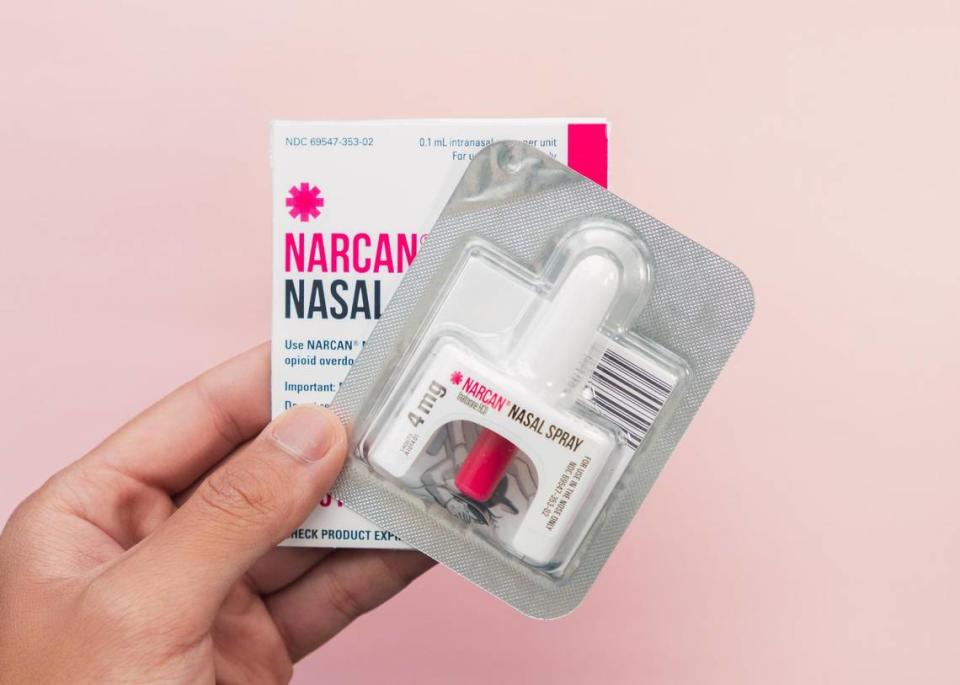Fentanyl overdose reversal spray ‘standing by’ for every public school in Charlotte
With the White House charting action in schools nationwide to curb teen drug use and deaths, Charlotte-Mecklenburg leaders plan to stock opioid overdose-reversal medicine in hallways.
While there have been no documented fatal overdoses in Charlotte-Mecklenburg Schools, some data suggests drug use among students is on the rise. Fentanyl — a synthetic opioid — is pervasive in street-bought drugs, experts say.
Naloxone, an overdose-reversal medicine (commonly called Narcan), will be available in every school, pending CMS board approval, Raynard Washington, Mecklenburg health director, told The Charlotte Observer this week.
“We are standing by ready to start,” he said.
The Observer first reported on the district’s plan to allow naloxone in schools in September.
Just last week, the Biden administration sent schools guidance saying kids and teens have easy access to illegal pain pills. The letter — in bolded and underlined font — says schools need to have naloxone on hand and train students and employees on how and when to use it.
As of 2022, 30 states expressly authorized K-12 schools to possess and use naloxone, according to the Legislative Analysis and Public Policy Association. Only one state — Rhode Island — required schools to keep it on hand.

Charlotte-Mecklenburg Schools board members all refused to be interviewed or did not respond to emails asking for their take on the district’s response to fentanyl risks.
The Mecklenburg County Public Health Department has previously partnered with the school district to train school nurses, stock emergency first aid and supplies and plan a pandemic response.
The Narcan doses will be stored in medical supply boxes in hallways that already house defibrillators for cardiac events and Epipens for emergency allergic reactions, Washington said.
CMS has not said when it expects a board vote, which would clear the way for stocking the medicine.
Schools will have Narcan in the form of a nasal spray, the health department told the Observer. The medicine is fast-acting to reverse an opioid overdose and is considered safe to use even if drug use is suspected but not the cause of someone’s illness. Earlier this year, federal regulators took action to make 4 mg Narcan nasal spray available over-the-counter without a prescription.
Opioid settlement funds in Charlotte
County leaders bought the naloxone with part of the more than $70 million it expects over the next 18 years as pay-outs from legal action against drug companies.
The lawsuit settlement funds come from money paid by major pharmaceutical companies that prescribed opioid drugs blamed for a nation’s addiction epidemic. North Carolina is in line to get $1.5 billion from the funds, most of which will be sent to local governments for planned spending. So far, the latest estimate shows local governments have approved at least $1.5 million to distribute additional naloxone across local jails, communities and schools.
Washington says if the Charlotte-Mecklenburg Schools’ overdose medication is used, a team of trained staff will make sure that each dose is promptly replaced.
He says teens and young adults face risks of substance abuse or misuse — and potentially deadly outcomes — just as adults would.
Mecklenburg County’s other key measures in response to the opioid crisis include equipping first responders and community groups with Narcan; expanding local addiction treatment services; intercepting those in jail with drug histories to provide help beyond health care; and funding services for people in recovery like housing and job training.
With federal restrictions continuing on lawful opioid drug manufacturing, Mecklenburg government leaders are shepherding millions in lawsuit settlement dollars. As part of the strategy, a local community survey among key stakeholders last year found most think “early intervention” is a top priority — second only to employment-related services to help those in recovery.
Washington says early intervention — combined with harm reduction and a myriad of community support services — is critical.
“It’s taken its toll on whole communities,” he said. “We’ve got work to do to be able to make sure that we prevent another generation of people with dependency on opioids.”

